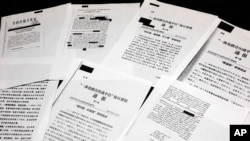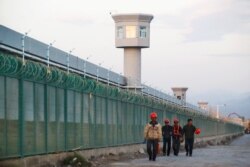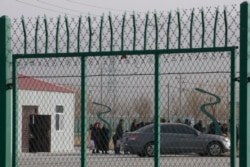The watchtowers, double-locked doors and video cameras within the Chinese camps are there “to prevent escapes.” The Uighurs and other ethnic minorities held there get points for how well they speak Mandarin and follow rules. Earning points makes it possible for them one day to be released.
The Chinese government has repeatedly described these camps as job training centers. It says that people are there voluntarily.
But government documents show that the centers are instead what former detainees have described: forced ideological and behavioral re-education camps run in secret.
The documents were secretly given to a group of news media organizations. They describe the Chinese government’s exacting method of detaining ethnic minorities even before they commit a crime. The government does this with the aim of rewiring their thoughts and the language they speak.
The International Consortium of Investigative Journalists (ICIJ) received the documents from an unnamed source. The group confirmed information within the documents by examining state media reports and public notices from the time and talking with experts and former camp detainees.
The ICIJ released the documents on Sunday. Their release came a week after The New York Times published 400 pages of leaked government documents on the issue.
Taken as a whole, the leaked documents give the fullest picture yet of high-technology mass detention in the 21st century. Experts say the documents describe a system that targets, spies on and rates ethnic minorities -- especially Uighurs.
The Uighurs are a mostly Muslim Turkic minority, with their own language and culture. About 11 million Uighurs live in China’s Xinjiang Uighur Autonomous Region, the Uighur homeland.
Rights groups and experts estimate that between 1 and 2 million Uighurs and other minorities have been held in camps across Xinjiang.
The documents “confirm that this is a form of cultural genocide,” said Adrian Zenz, a leading security expert on Xinjiang. “It really shows that from the onset, the Chinese government had a plan.”
The documents also show how China is testing a new form of social control using computer data and artificial intelligence. Computers use information collected by mass surveillance technology to create huge lists of people to be questioned or detained.
“There’s no other place in the world where a computer can send you to an internment camp,” said Rian Thum, a Xinjiang expert at Britain’s University of Nottingham. He called the situation “unprecedented” -- something that has never happened before.
Xinjiang is a huge area that borders eight countries, including Russia, Pakistan and Afghanistan. Uighurs have long opposed the government’s heavy-handed rule in Xinjiang.
After the September 11, 2001 attacks in the United States, China began saying its security measures and religious restrictions were necessary to prevent terrorism.
In 2014, Chinese President Xi Jinping launched what he called a “People’s War on Terror.” His announcement came shortly after bombs set off by Uighur militants exploded at a train station in Urumqi, the capital of Xinjiang.
In 2016, the government increased its repressive measures. That year, Xi named Chen Quanguo as Xinjiang’s new head. Before that, Chen served five years as the Communist Party chief in Tibet. Observers consider Chen to be one of the “architects” of Xinjiang’s internment camps.
Most of the leaked documents released Sunday were from 2017. By then, Xinjiang’s “War on Terror” had turned into an extraordinary mass detention campaign using military-style technology.
The Chinese government says its practices in Xinjiang work.
“Since the measures have been taken, there’s no single terrorist incident in the past three years,” said the Chinese Embassy in the United Kingdom. “Xinjiang is much safer.” An embassy statement described the leaked documents in question as “fake news.”
The documents make it clear that many of those detained have not actually done anything. One paper directly states that the purpose of the widespread digital spying is “to prevent problems before they happen.”
“It’s the dark days of the Cultural Revolution,” said Zenz, "Except now it’s powered by high-tech.”
I'm Caty Weaver.
And I'm Ashley Thompson.
The Associated Press reported this story. Ashley Thompson adapted it for VOA Learning English. George Grow was the editor.
_____________________________________________________________
Words in This Story
watchtower - n. a tall structure that is used by a person who guards or watches a place
lock - n. a device that keeps something (such as a door, window, or box) from being opened and that is usually opened by using a key
ideological - adj. refers to the set of ideas and beliefs of a group or political party
commit - v. to do (something that is illegal or harmful)
onset - n. the beginning of something
surveillance - n. the act of carefully watching someone or something especially in order to prevent or detect a crime
practice - n. something that is done often or regularly
page - n. one side of a sheet of paper especially in a book, magazine, etc.







